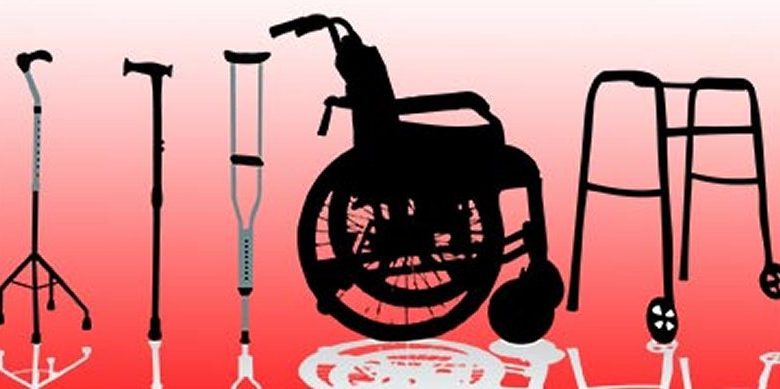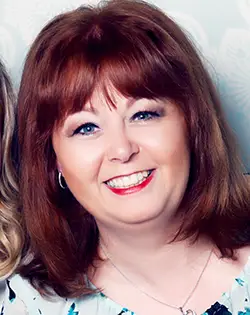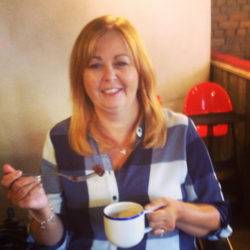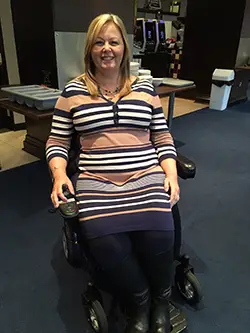
The new ‘normal’: adapting to disability later in life
For Disability Horizons contributor Lynley Adams, becoming disabled later in life has been an earth-shattering experience. Here, she explains why she’s finally coming to terms with her new ‘normal’, and what she’s learnt along the way…
I am sat here, writing to you from my bedroom on a Monday morning. Not a particularly odd sentence normally. But for me, a 49-year-old ex Head of Department at a 1,400 pupil secondary school, this is not where I am supposed to be. Even after two years, it still feels very weird spending Sunday nights actually watching TV,rather than getting my marking finished or preparing lessons, and weirder still to be sat here on a Monday morning.
My so called ‘normal’ life ended just over two years ago. Whilst teaching a class full of boisterous 15- year- olds, I suffered a catastrophic spontaneous fracture to my pelvis. I recall feeling the most horrendous pain and having to hang on to the desk until the end of the lesson.
After the fracture was discovered though an MRI scan, I was diagnosed with underlying osteoporosis, which had caused the fracture. This in turn had damaged nerves in the sacral region, at the bottom of my spine, and has now left me with permanent chronic pain syndrome.
 This is now my ‘new’ life, a life where I cannot stand without crutches, cannot walk at all due to severe pain, and need to use a wheelchair to get around. A new life that involves a cocktail of different medications to keep me from screaming in pain, of learning to pace myself so I don’t increase my suffering, and most difficult of all, of trying to come to terms with the fact that I am now disabled.
This is now my ‘new’ life, a life where I cannot stand without crutches, cannot walk at all due to severe pain, and need to use a wheelchair to get around. A new life that involves a cocktail of different medications to keep me from screaming in pain, of learning to pace myself so I don’t increase my suffering, and most difficult of all, of trying to come to terms with the fact that I am now disabled.
The last part, I must confess is the tricky bit. How do I get used to this new life when my ‘normal’ one was so busy? It’s the difference between rushing around, teaching five different classes every day, along with all the after school activities and out-of-term school outings, and a new routine where I can’t go anywhere without someone accompanying me. In fact, I need my partner to help me do everything, and that has obviously changed our relationship.
While I don’t want to sound too negative, there’s a whole list of things I can’t do anymore. I can’t work, I can’t dress myself, I can’t use the shower or get into the bath and I can’t drive.- I can’t do any flipping thing without pain and help and it’s taken some getting used to. I have spent the last two years trying to get my head around it and trying to understand what the future might look like for me.
Moving on and living my life
 But, at long last, I’m starting to see the positives. I can now spend time doing other things that I couldn’t before. I can catch up with all the box sets I’d heard people talking about while I was too busy to watch TV. I can take advantage of what my partner and I call ‘retirement time’, and go shopping when everyone else is at work. I can spend time just sitting in the garden and listening to the world go by.
But, at long last, I’m starting to see the positives. I can now spend time doing other things that I couldn’t before. I can catch up with all the box sets I’d heard people talking about while I was too busy to watch TV. I can take advantage of what my partner and I call ‘retirement time’, and go shopping when everyone else is at work. I can spend time just sitting in the garden and listening to the world go by.
But best of all, I’ve also discovered a love of writing, so I’ve started to write a blog based on my experiences of becoming disabled later in life. Although there are now so many things I cannot do, this has really helped me to focus on what I can do instead. I’m not saying that it’s been easy by any means, but I’ve had to do it in order to move on.
So, what else have I learned upon my ‘journey’? Well firstly, being disabled equips you with a whole host new skills. You have to be organised, and to keep copies of everything (doctors notes, letters, DWP forms, EVERYTHING).Trust me on this one, you’ll constantly be asked to fill in forms that are exactly the same as the ones you filled in last week, but for a different reason!
You’ll also need to become the maker of checklists. For example, a list of what you have to take with you to hospital appointments, as you can’t expect the hospital to have all your notes in one place. It rarely happens, especially if you have two or more consultants. So get a copy of the appointment by getting in touch with the consultant’s secretary. Make sure you keep her/him on side as they’re an essential allay!
You’ll also need a list for going away. Even a short weekend away requires a list of mammoth proportions detailing what you’ll need to take and what you’ll need to do. You’ll have to ask about disabled rooms, ramp access, disabled parking, hoists for the swimming pool, access within the hotel/cottage ….etc. You need a holiday just to get over booking this one!
 Unfortunately, the world where you could just grab a last-minute holiday deal and your bag has upped and gone. It cannot be done if you use a wheelchair! But with a patient persona and a friendly telephone voice, you can still have a fantastic holiday. Just make sure the hotel or places you plan on visiting have what you need from your list!
Unfortunately, the world where you could just grab a last-minute holiday deal and your bag has upped and gone. It cannot be done if you use a wheelchair! But with a patient persona and a friendly telephone voice, you can still have a fantastic holiday. Just make sure the hotel or places you plan on visiting have what you need from your list!
And above all else, patience and a sense of humour is essential. There will be times when the hurdles seem too high to conquer, and nothing feels like it’s going your way. This is when a deep breath and a wry smile with a muttered “for #*#*! sake” will take you a long way.
There are many challenges ahead, and some of them will make you feel like you’ll never manage to adapt to this ‘new life’. But you will. Little by little you will learn how to function and get your life back, albeit in a different state from the one you expected, and that is the key point.
There is a life out there for you, BUT it is going to be different, and accepting that is the main challenge that you will have to face. Allow yourself to grieve for your former life; clinging onto your ‘old’ life is natural and understandable. But with time you will learn that letting go of how you used to do things is essential in order to move forward, and accept yourself as you are now.
I think I’m what is usually referred to as a ‘work in progress’. I’m trying, but I know I’m not quite there yet. This ‘adapting’ lark is a tricky one, but I know I will get there eventually, I’m far too keen on living to let something like this stop me.
By Lynley Adams
Get in touch by messaging us on Facebook, tweeting us @DHorizons, emailing us at editor@disabilityhorizons.com or leaving your comments below.
https://disabilityhorizonscom.onyx-sites.io/2016/07/alexandra-kutas-meet-the-disabled-model-challenging-the-fashion-industry/
https://disabilityhorizonscom.onyx-sites.io/2016/10/disability-and-fashion-inclusive-catwalk-breaking-boundaries/
Really interesting read – Scope has created a guide for people who acquire an impairment in later life which might be useful for other people in similar situations https://www.scope.org.uk/support/disabled-people/becoming-disabled/overview